The market may be scaling new peaks every day but there may be little to cheer for the disinvestment-bound government. Shares of almost all public sector undertakings (PSUs) have given up gains and are down an average 20 per cent from their 2014 highs.
Worryingly for the government, which intends to raise over Rs 43,000 crore through PSU disinvestment in the next seven months, shares of some of the shortlisted candidates such as Steel Authority of India (down 24 per cent from this year’s high), Rural Electrification Corporation (down 30 per cent), Power Finance Corporation (24 per cent) and NHPC (down 27 per cent) have lost significant ground.
Coal India, which will probably be the biggest disinvestment in terms of value, is down around 11 per cent from its highs. Also, the CPSE Index, the barometer for PSU stock performance, has declined more than 13 per cent from its highs touched during end May after Narendra Modi assumed charge as prime minister.
Meanwhile, benchmark indices Sensex and Nifty are up nearly 30 per cent this year and trading at all-time high levels. A drop in share prices of PSU stocks from their highs means the government will have to sell more of its holding to meet the disinvestment target.
“Stocks that had risen sharply have lost ground. In a lot of cases it’s due to a sector or company-specific issue. For instance, PSU bank shares have fallen due to governance and asset quality concerns,” said Motilal Oswal, chairman, Motilal Oswal Financial Services.
On a year-to-date basis, most PSU stocks are still sitting on decent gains thanks to the unprecedented rally seen during the May-June period. “There was a large rally in public sector companies from their lows early this year on hopes from the government this year. However, once these companies began to trade at close to fair value, further upside would only have been justified by earnings growth visibility, which for many of them is not in evidence,” said Prateek Agarwal, chief investment officer, ASK Investment Managers.
Among the few PSU stocks that have not lost ground are oil marketing companies, which have benefited from a drop in global oil prices and narrowing of the subsidy burden.
Krishna Kumar, head of equities at Sundaram Asset Management Company, which runs the PSU Opportunities Fund, believes the performance of companies is linked to how much of an effect policy reforms have had on them. “Companies where the reforms have taken effect have all done well. It is expected that incrementally there would be more and more clarity on reforms from the government,” he said.
In April, global brokerage CLSA had predicted that PSU stocks would see better days if Modi came to power. The brokerage had said Modi would professionalise the management and giving PSUs a chance to turn around through technology upgrades.
Experts also point out that, as on previous occasions, prices of disinvestment candidates could come under pressure ahead of their share sales as more supply would come into the market.

)
